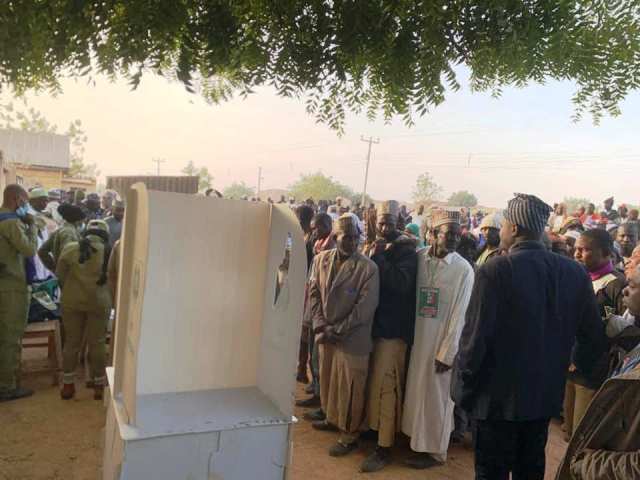 People queue to vote. [photo: INEC, Nigeria's Independent National Electoral Commission]
People queue to vote. [photo: INEC, Nigeria's Independent National Electoral Commission]
[The following are two excerpts from the introduction to a special edition of The Round Table: The Commonwealth Journal of International Affairs.]
Nigeria’s democratic journey reached another milestone following the successful completion of the general elections in 2019. Given the intense competition that surrounds elections in Nigeria, every electoral period generates fear of a possible large-scale conflict that may cause democratic breakdown or national disintegration. The fact that Nigeria successfully carried out the elections is a major achievement in its political history.
Clearly, the 2019 elections were followed with great expectations because of the improvements recorded in the previous general elections in 2015. The 2015 elections generated positive perception of the electoral process for a number of reasons. For the first time in Nigeria’s electoral history, a winner emerged from the opposition party, and there was a successful alternation of power. The 2015 elections saw remarkable improvements in the incorporation of technology into the electoral process, which contributed to strengthening the integrity of the elections. Since 1999, after democratic transition, there was also a decline in election petitions that had become a common phenomenon after the announcement of election results. It was, therefore, not a surprise that international and local observers gave some positive assessments of the 2015 elections.
Takeaways from the 2019 general elections
The 2019 elections indicate no significant progress in Nigeria’s democratic politics. The issues that have characterised politics and impacted negatively on democratic consolidation featured prominently. The contributions in the present special issue have compellingly illustrated how the elections produced the recurrent problems Nigeria has faced over a period of time. Before delving into the detailed studies focusing on the topics, we provide a summary of the dominant issues that characterised the 2019 elections below:
Weak democratic culture: The elections show that the political elite are yet to fully embrace the ethos and values that underlie liberal democracy. Elite behaviour remains a challenge in Nigeria’s democracy. Driven by the ‘do-or-die’ mentality, the elite engaged in practices that undermined and frustrated efforts established by the EMB to strengthen the electoral process. The party primaries for candidate selection were overwhelmed with large-scale violence and unresolved controversies. There were arson attacks on INEC’s buildings and election materials with a deliberate aim of sabotaging the elections. The elite recruited political thugs to intimidate voters and developed sophisticated strategies for vote buying and other malpractices, despite an intense campaign against them before the elections.
Weak and non-neutral state institutions: The elections bring to the fore the popular discourse on the weakness of state institutions and their vulnerability to manipulation by the political elite. Election-related agencies that are germane to ensuring electoral integrity could not meaningfully display sufficient independence and impartiality in the elections. The EMB and security agencies cannot be totally absolved from many allegations of bias for the ruling party. There were numerous cases of vote cancellations by the INEC in areas considered support-bases of the opposition. INEC’s sudden postponement of the presidential election a few hours to its commencement has also been alleged to have been engineered by the political actors – although with no substantial proof. The massive deployment of security personnel to opposition areas has been claimed to have discouraged voting in the area and limited the chances of the opposition presidential candidate.
Low public trust: The citizen’s trust in democratic institutions and processes has been on a downward trend since democratic transition in 1999. Surveys demonstrate rising public dissatisfaction in the Nigerian state due to bad governance, failure to deliver on promises and perceived partiality of state institutions, including those related to elections. This has accounted for growing political apathy and aversion to democratic principles by the citizens. The 2019 general elections experienced the worst voter apathy in the history of the country. In fact, President Muhammadu Buhari was re-elected by just 18% of registered voters, while only 35% registered voters voted in the election.
Cleavage-based voting: The voting pattern shows that Nigerian voters are not yet sophisticated in their voting decisions. Their choices are still driven by primordial sentiments, particularly ethnicity and religion, and attest to social divisions that have enveloped politics in the country since its independence. Notwithstanding the reality that the principal candidates for the presidential election shared many identities in terms of religion and ethnicity, the geopolitics of support for their parties reinforces ethno-religious factors in voter behaviour. The All Progressives Congress (APC) won in the geo-political zones with a huge population of Muslims and the northern Hausa-Fulani group, while the People’s Democratic Party (PDP) attracted more votes in areas more inhabited by Christians and southern ethnic groups.
Election violence: Violence has been a hallmark of elections in Nigeria. It was responsible for democracy breakdown in the previous democratic experiences. Since the transition to democracy in 1999, elections have been marred by violence due to a low level of democratic culture. A similar pattern of violence occurred in the 2019 elections, although with lesser cases of post-election violence experienced in 2011. The Situation Room, a local civil society group, reported that 626 lives were lost in the election process, including the pre-election campaign period and during the election.
Hakeem Onapajo is with the Department of Political Science and International Relations, Nile University of Nigeria , Abuja, Nigeria and Dele Babalola is with the School of Psychology, Politics and Sociology, Canterbury Christ Church University , Canterbury, UK.



